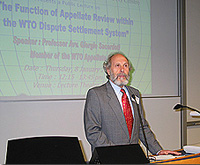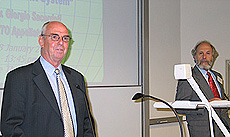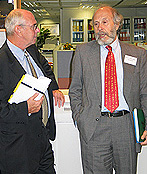Righting the applecart with the WTO
Shiona Mackenzie
Who do you call when your country stands accused of unfairly subsidizing its agricultural exports, or sanctioning imports? The World Trade Organization's 148 member nations know.
On the invitation of the WTO Law and Dispute Resolution Centre, Professor Avv Giorgio Sacerdoti gave a public lecture on the "Function of Appellate Review within the WTO Dispute Settlement System" on 8 January at CityU. Professor of International Law and European Law atThe WTO is the successor of the General Agreement on Tariffs and Trade (GATT), established after WWII. GATT was an ineffective system, Professor Avv. Sacerdoti explained, with numerous instances of noncompliance with its decisions and of exceptions to the rules. Under GATT, an initial series of trade negotiations concerning tariff reductions was held; later negotiations included anti-dumping and non-tariff measures. The WTO resulted from the "Uruguay Round" of negotiations, held from 1986 to 1994.
Working for peaceful solutions
The WTO serves to avoid political conflict and break-downs in international relations and although its procedures may resemble those of a court or
The AB, made up of impartial experts, reports to the DSB, which systematically adopts its recommendations that, thereby, become binding decisions. Why? According to Sacerdoti, this is partly because the AB's legal eagles examine the facts and the law with an unbiased eye, and partly because, once endorsed by consensus of the DSB, it has the entire weight of the WTO behind it. Furthermore, the implementation mechanism is monitored by the DSB; the community cannot act unilaterally.
Sacerdoti's insider accounts of disputes, one concerning the export of apples from the US to Japan, and another to do with the export of lumber from Canada to the US, were particularly informative. During the Q&A session that followed, interest was expressed by the audience of some 70 people in learning more about the WTO dispute resolution system on a future occasion.
Professor Sacerdoti has held various posts in the public sector, including Vice-Chairman of the OECD Working Group on Bribery in International Business Transactions (since 1999), and Consultant to the World Bank (1999-2000) in matters related to international investments, trade, development and good governance. In the private sector, he has often served as arbitrator and chairman of arbitration tribunals and in ad hoc arbitration proceedings for the settlement of international commercial disputes. After graduating from the




